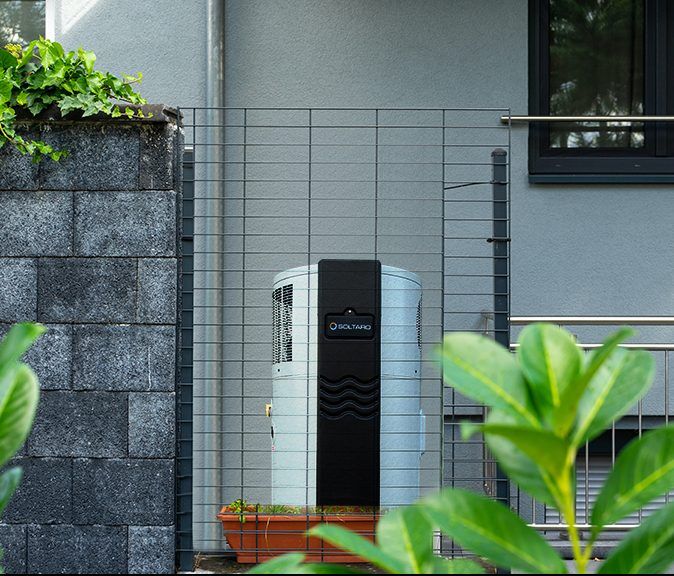Air Source Heat Pumps – What are they all about?

With the sea of renewable tech available, you may have heard ASHP or Air Source Heat Pumps being mentioned frequently. They’ve been around since the 1940’s with a surge in popularity during the 1970’s, but today’s technology makes them a no brainer for the most efficient way to heat your hot water.
Like other renewable tech, Air Source Heat Pumps have gained in popularity over the last 5-10 years, and with good reason. Let’s explore why.
How does an Air Source heat pump work?
Everything around us contains thermal energy. Air Source Heat Pumps work in a similar method to your refrigerator, only in reverse. They pull warm air from outside and use electricity to compress the ‘refrigerant’, naturally increasing the pressure and therefore the temperature. This is then used to heat the hot water inside the tank and delivered as you need it.
ASHP v gas boiler or water heater – the benefits?
Efficiency is a key reason to invest in a heat pump. Savings of over 80% against a gas boiler and over 3 times more efficient than a typical water heater. The lifespan is typically around 12 years, whilst a well maintained unit could last up to 15. This is typically much longer than a gas boiler.
Lower Energy Bills. A typical household uses over 160 litres of hot water per day. This converts to spending over $970 a year on hot water based on a typical standard tariff. Now we know you may not always be heating your hot water on expensive day time tariffs, but using gas to heat your hot water is no longer the inexpensive option it once was.
And what about lowering your carbon footprint? With a heat pump, cleaner energy consumption plays a large part in reducing environmental impact and emission’s. As the units have a longer lifespan than a typical boiler or water heater, this makes them a sustainable choice for efficiency and reliability.
Safety is also very important. When compared to gas boilers, heat pumps don’t generate heat or get hot to touch on the unit itself. There are no gas leaks to worry about either. As the hot water is stored at a slightly lower temperature to that of a gas boiler, there is much less likelihood of scalding incidents too.
What is an All-in-One Heat Pump?
Soltaro have recently launched the All-in-One Heat Pump and as it’s an all-in-one unit, everything encased in a single unit. No secondary outdoor unit to find a home for. Simple, effective and space efficient. Soltaro’s Qendercore smart software also plays a huge part in making their heat pump even more efficient.
Can I power a heat pump from excess solar?
With a Soltaro Air Source Heat Pump you can. In addition to powering from the grid, if you have a Solar PV system installed at your home or business, you can use excess solar to power your heat pump. This lowers your energy bills even further, making an investment in heat pumps a very viable proposition. Don’t forget that the smart software in the Soltaro ASHP takes excess solar even further. It will alert you at the best times to utilise the excess power so that you can maximise every ounce of sunshine.
Do you get constant hot water with a heat pump?
Yes, a well insulated heat pump will provide constant hot water for home use. As with any hot water heating system or boiler, it may require a boost from time to time with excessive simultaneous usage.
Are there any incentives to help me pay for an ASHP?
In short, yes there are. Most countries offer incentives grants or offers to help you offset the cost of a new Air Source Heat Pump. With renewable targets looming for worldwide Governments, the need to push home owners to switch from fossil fuels to electric has never been more important. Click here for further information on incentives.
In summary, heat pumps are the way forward. Whether you choose to ditch your expensive water heating system now, or wait until your current system needs replacing. Air Source Heat Pumps will help you lower your energy costs and benefit the environment. A win win!
Find out more about Soltaro Heat Pumps by visiting our page here.
Get in touch
If you'd like to find out more about the AIO2 or any of our other products please complete your contact details using the steps below and we'd be happy to answer questions you have.
Aftercare & Support
Don't forget to register your new Soltaro purchase to validate and extend your warranty.
Register ProductsClich here to raise a support ticket and in most cases we can fix the problem without the need to visit your home.
Report a Technical IssueAll of our documentation including terms & conditions, warranty and techncal mannuals can be found here.
Documentation
